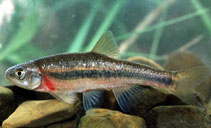| Family: |
Leuciscidae (Minnows), subfamily: Pogonichthyinae |
| Max. size: |
11.5 cm TL (male/unsexed) |
| Environment: |
demersal; freshwater |
| Distribution: |
North America: Atlantic Slope (mostly above Fall Line) from lower Delaware River drainage in Pennsylvania to Savannah River drainage in Georgia, USA; Ohio River basin in West Virginia and Ohio to northeast Mississippi, USA. Three subspecies were recognized: Clinostomus funduloides funduloides; Clinostomus funduloides estor; and undescribed subspecies. |
| Diagnosis: |
Anal soft rays: 9-9. Clinostomus funduloides can be distinguished by the following characters: complete decurved lateral line with 43-57 lateral scales; anal fin with 9 rays; pharyngeal teeth 2,5-4,2; mouth large and oblique; snout long and pointed; caudal fin large and forked; small scales; dorsal fin origin behind pelvic fin origin. Compressed boy, olive above, dark stripe along back, dark-edged scales on upper side; green to yellow-gold stripe (brightest on large individuals) above dusky stripe along silver side; scattered dark blotches on side of large individuals; white, orange or red lower side; breeding male has dark blue above, bright brick red lower side. Similar to Clinostomus elongatus, Luxilus chrysocephalus and L. cornutus (Ref. 86798). |
| Biology: |
Inhabits rocky flowing pools of headwaters, creeks and small rivers. Usually occurs in small clear streams (Ref. 86798). |
| IUCN Red List Status: |
Least Concern (LC); Date assessed: 04 November 2011 Ref. (130435)
|
| Threat to humans: |
harmless |
Source and more info: www.fishbase.org. For personal, classroom, and other internal use only. Not for publication.
